- Home
- Melissa Walker
Unbreak My Heart
Unbreak My Heart Read online
unbreak my heart
MELISSA WALKER
Contents
Title Page
Dedication
chapter one
chapter two
chapter three
chapter four
chapter five
chapter six
chapter seven
chapter eight
chapter nine
chapter ten
chapter eleven
chapter twelve
chapter thirteen
chapter fourteen
chapter fifteen
chapter sixteen
chapter seventeen
chapter eighteen
chapter nineteen
chapter twenty
chapter twenty-one
chapter twenty-two
chapter twenty-three
chapter twenty-four
chapter twenty-five
chapter twenty-six
chapter twenty-seven
chapter twenty-eight
chapter twenty-nine
chapter thirty
chapter thirty-one
chapter thirty-two
chapter thirty-three
chapter thirty-four
chapter thirty-five
chapter thirty-six
chapter thirty-seven
chapter thirty-eight
chapter thirty-nine
chapter forty
acknowledgments
Also by Melissa Walker
Copyright
For June,
who has my heart
chapter one
“Sit on it,” I say.
“Excuse me?” asks Olive, with an attitude that makes her seem way older than her ten years. Her tone plus her big angular glasses—green-framed rectangles that look more fancy-architect than fifth-grade—put her somewhere near forty in my book. She’s always been our family’s little adult.
“The suitcase, Livy,” I say sweetly. “Please?”
My sister reluctantly plops down on top of my raggedy plaid bag. It moves just enough so that I can zip it shut.
“Thanks.”
“You better get it downstairs right now,” says Olive, running ahead of me into the hallway. “The car’s almost full.”
I sigh and take one more glance around my room. It looks just like it always does—sunny, bright, clean; a bookshelf along the back wall filled with rows and rows of the series I love; a white wicker hamper in the corner with a stray gray sweatshirt on top of it; the flower-covered comforter I’ve publicly outgrown but that secretly makes me feel safe. I grab my journal off the nightstand and shove it into the front pocket of my bag. If I’m not going to have Internet or phone service for most of the summer, I need somewhere to record my status updates.
I stare in the big mirror across from my bed. My hair hangs down around my face, and my eyes are still a little puffy from crying. I pinch my cheeks to make them pink and try a smile. It looks more like the grimace of someone trying to pretend she’s not in pain. I frown again. At least frowns are honest.
I heave the suitcase off my bed. I’m going away for three months, but this is the only bag I’m allowed to bring, because I’ll be living on a boat. With my family. All. Summer. Long.
If my sophomore year had gone differently, I probably would have fought harder to spend this summer—the summer I turned sixteen, the summer of making out, the summer of memories that will last forever, the summer I always imagined would be the very best one—at home on my own. I’m responsible, after all, and my parents trust me. I could have had an amazing time working days at Razzy’s, the Bishop Heights Mall candy shop where I had a job this year, looking for my it’s-just-like-in-the-movies perfect guy, and spending nights hanging out with Amanda … Amanda.
I feel a stone drop in my stomach.
I head downstairs, letting my big bag plunk, plunk, plunk on each step.
“There she is,” says Mom, smiling brightly. “Little Miss Sunshine.”
I don’t smile back. She’s being sarcastic, and she’s wearing a giant floppy straw hat, the kind that only almost-famous girls in LA and very old ladies in Florida can pull off. I guess now that she’s less lawyer and more boater she thinks it works. She is wrong.
Dad comes around to the back of the car and slides my bag into the one slot that’s left. It fits perfectly, and he sighs with satisfaction. It’s a real thrill for him when the sport wagon is well packed.
“How good is your dad?” he asks me.
“You have sunscreen on your nose,” I say to him.
He smiles and rubs it in. Nothing is penetrating the parents’ Good Mood today, not even me being grumpy. I guess they’re getting used to it.
I wasn’t always such a downer. Up until, like, two weeks ago, I was Clementine Williams, happy and upbeat and kind of hilarious, if I do say so myself. But that was before everything exploded in my face.
Now I’m Clementine Williams, outcast. And that’s on a good day.
“Come on, Clem,” says Mom, putting her arm around me and easing me toward the car. She’s been gentle with me this week, mostly, and I appreciate that.
I slide into the backseat next to Olive, who’s squished against a cooler that’s taking up most of our space. Good thing the drive to the marina is only twenty minutes.
“Let the Williams Family Summer of Boating begin!” cheers Dad. Mom gives a quick “Woot-woot,” and Olive raises her hands in the air and shouts, “Wahoo!” I add an uninspired “Yay” so they won’t get on my case. Then I stare out the window and watch my house, then my neighborhood, then my town, disappear.
As we pull into the marina, I see our boat—The Possibility. It’s a forty-two-foot Catalina three-cabin Pullman. My parents traded in our twenty-three-foot O’Day—Night Wind II—last year, and they’ve been readying The Possibility for this summer trip since then. At first it felt insanely roomy compared to the Night Wind II, where Olive and I basically had to sleep on narrow side couches in the main cabin of the boat. My parents’ V-berth bedroom didn’t even have a door, so my dad’s snoring chased me out to the cockpit to sleep under the stars pretty often.
Yeah, the Night Wind II seemed small and The Possibility plenty big on quick weekend sails. I even brought Amanda up here a few times when Mom didn’t come, and Dad let us have the master cabin so we could “stay up late and giggle,” as he reductively put it. It was fun.
But now that I’m faced with the prospect of spending three whole months on this thing, it doesn’t look very spacious. There are two heads—that means bathrooms—and three staterooms, which is a fancy word for teeny-tiny bedrooms. My parents have a master berth with their own head, and I have a double berth on the starboard side. Olive’s port-side room has bunk beds, but she’s still young enough to think that’ll be fun. (Wait until she falls out when Dad anchors us too close to a main waterway, and the waves from passing ships knock her right on her butt. It’s happened before.)
I lug the plaid bag into my stateroom and close the door. I just want to stretch out with my music for a while, so I put in earbuds and hope I won’t be able to hear Mom when she starts bugging me to help unpack.
I hit Shuffle just to see what comes up, and when I hear the strains of “Beautiful Girl” by INXS, I feel a tear well in my eye. Like, instantly. I thought they’d all dried up, but no. I swear I deleted this playlist, but I must have had another copy of “Beautiful Girl” stored. I let myself be sad for thirty seconds, and then I angrily wipe away the tear.
My mom gives me exactly six minutes to be antisocial and unhelpful. I know because I get to listen to “Must I Paint You a Picture?” by Billy Bragg, which is five and a half minutes long, and as it ends, I open my eyes to see Mom’s messenger.
>
“You can’t just bust into my room,” I say to Olive, who has her hands on her hips and a stern look on her face, which is way too close to mine.
“Yes, I can,” she says, pushing her angled glasses up on her nose. “These doors don’t lock.”
Her serious mouth breaks into a grin, like she knows she’s going to get so much time with me this summer because we’re in this majorly contained space and she can’t help but show her total elation about that fact.
I soften a little.
“Mom needs you,” she says.
“Fine.” I stand up and make her scramble to get out of my way.
I march into the main cabin—well, I take three steps into the main cabin, anyway, passing my dad in the nav station port side—and there is my mother, organizing the canned foods in the galley, which normal people call the kitchen.
“Did you get pickles?” asks Olive, kneeling on the couch in front of the galley and leaning onto the bright yellow counter.
“Yes, I did, Little Miss Dill,” says Mom.
“Yippee!” sings Olive. You’d think she won $100 on a scratch-off lotto card. Pickles get this reaction? My little sister is seriously high today.
“And I got the big marshmallows for you, Clem,” says Mom, putting up the bag of Jet-Puffeds that I always request for adding to morning hot chocolate.
I nod. I do not Yippee.
I watch Mom put about fifty cans up into the top cabinet above the stove. She has a cookbook called A Man, A Can, and a Plan. Obviously, this book is for a twenty-two-year-old guy who hasn’t learned to make a meal with real food yet, but Mom likes to call it “the Boat Cookbook.” Creating a dinner entirely out of canned goods makes her feel really accomplished. “Besides,” she told us when we had the “boat grocery list” family meeting last week, “canned goods keep for so long! We’ll eat well every night.”
I had nodded then—I’d just wanted to be released from the family meeting so I could go back to my room and mope—but now, as I watch the cans of peas, pinto beans, and SpaghettiOs come out of her box, I wonder if I should have stood up for some fresher foods.
“What do you need me to help with?” I ask. I try to keep any sort of “tone” out of my voice. It’s not my family’s fault I’ve become a pariah.
“You could make sure everything’s out of the car and then drive it over to long-term parking,” says Mom. “It’ll be your last chance to break in that license for a while.”
“Okay,” I say. And then, to Olive, “Come on.”
My sister smiles widely and I stare back at her and try to look remotely friendly. I owe it to her to let her tag along, especially since I’ve been nasty all week.
Mom hands me the car keys, and Olive and I climb up the short ladder into the cockpit before carefully stepping off the boat and onto the dock.
I walk briskly toward the parking lot, and she jogs to keep up.
“Do you think Dad will let me unfurl the jib when we get underway?” she asks.
“Probably.” My voice has a who-cares tone that I don’t try to hide.
When we get to the car, Olive makes a big show of putting on her seat belt, even though we’re only driving about a hundred feet to the long-term parking lot.
I give her a look and she says, “What? You’ve only been driving for, like, two weeks.”
Two weeks exactly, actually. I got my license two Saturdays ago. That afternoon, I wanted to see who was around to go for a drive. I ended up texting Amanda and a few other people, but only one person responded right away. Unfortunately.
I pull into a spot in the shade and wrench up the parking brake.
“Nice,” says Olive. “I didn’t feel unsafe for a moment.”
“I’m so glad.” I step out of the car. When the sun hits my face, I close my eyes for a second to shake off the memory that’s encroaching.
“Clem?”
I open my eyes and look down at my little sister, who’s suddenly solemn.
“What?”
“I’m glad you’ve stopped crying.”
I half smile at her. “Me too.” I don’t tell her that just because the tears have mostly dried up, it doesn’t mean I’m better.
As we walk back to The Possibility, I see Mom unsnapping the blue canvas mainsail cover. Dad must want to get underway.
Before we go, though, I know we have to do one more thing.
I step back onto the boat and Dad pokes his head out from down below. “Ready?” he asks.
“Do we have a choice?” I ask.
“No!” Dad laughs really loudly. He is so happy right now. It’s almost contagious. Almost.
Mom folds up the sail cover and sits down on the cockpit seat. Dad settles into his captain’s chair, and Olive takes her perch next to him, the ultimate navigator. I sit back on the seat opposite Mom and tuck my legs underneath me.
“Now,” starts Dad. “What do you see?”
He smiles and looks around at us. “Livy?”
My sister is still at an age where she’s into this family game. Whenever we “embark on a new voyage”—which is my dad’s fancy way of saying “go sailing” (you’d think we were heading into outer space)—we have to go around the cockpit and state what we want from the trip, what we see in our future days of sailing.
“I am ready for a really fun summer,” says Olive. “I see swimming and fishing and cooking and eating and exploring islands.”
Olive likes to jump off the boat when we anchor and swim to the closest land, which is usually some random mud-beach where there’s nothing to do and no sand to lie out on. But I get it—I used to like that “explorer” game too.
“Excellent! All of that is very doable,” says Dad. “Clem?”
“Mom can go.”
“Okay,” says Dad. “Julia?”
“I see a warm, wonderful summer filled with family days,” says Mom. She’s taken off her straw hat and is leaning her head back so her face catches the sun. Her brown hair is styled into that short Mom cut, but she also has these freckles that sometimes make her look really young when she smiles. Like now.
“Family time!” says Dad, clapping his hands together. “I love it! Clem?”
I look at my dad, who’s smiling naively in my direction. He’s treating us like we’re his first-grade class. Suddenly I’m just annoyed. I’m sixteen years old. I don’t need to sit here, being forced to do some roundtable “What I See” exercise with my way-younger sister and my dopey parents. This is their dream summer—not mine.
“Clem?” he asks again. “What do you see?”
“I see a summer in exile.”
chapter two
We met on the first day of kindergarten, at the Play-Doh station. I was rolling a big blue ball in my hands, and Amanda asked to see it. Then she added a turned-up mouth and two eyes with her pieces of yellow clay.
After that, whenever anything made me sad, Amanda would say, “Do you need me to make you a smile?” She was like my friend–soul mate.
We talked about everything—from our first crushes in third grade to our late-arriving periods (Amanda got hers in eighth grade, I got mine in ninth)—while we sat on my bed and faced this big mirror on the opposite wall. We called it mirror-talking. My parents thought we were crazy, but there was something comforting about looking into the mirror at each other, and ourselves, while we talked. It made saying things easier somehow, just looking at reflections instead of the real person.
Maybe that’s why, for the past week, I’ve been trying to write her a letter about what happened. I can’t call her, and now that I’m stuck on this boat I certainly can’t go see her. So I brought a whole pad of light green paper with my initials, CSW, in dark blue script at the top.
Dear Amanda,
How can you just forget the entire history of
our friendship? Doesn’t being best friends for
over half our lives mean anything?
I crumple up the paper before I can write any more.
“
Kidnap Picnic!” Amanda had yelled as I opened the door after she’d rung the bell three boisterous times in a row.
Last summer she had a tendency to show up unexpectedly with a plan for the day. Usually, I went with it.
She stood on our front porch in cutoffs, a striped T-shirt, and oversized sunglasses, and she carried a beach bag that was almost twice the size of her entire body.
“My mom dropped me off. I’ve got sandwiches, chips, two sodas, and four magazines,” she said, walking past me through the door into the house. “But I forgot sunblock, so grab some when you go upstairs to get changed—forty-five or higher, please.” She patted a rosy cheek. “I’m fair.”
Amanda smiled and raised her sunglasses to the top of her head as she plopped down on the couch in the living room.
“I have to ask my—”
“Mr. and Mrs. Williams, Clem and I are going to the park!” she shouted, cupping her hands together like a megaphone. Then she grinned at me. “Done.”
Ten minutes later, with a nod from my mom and just one round of “Why can’t I go too?” whining from Olive—which was shut down by Dad telling her he’d take her to the pool instead—Amanda and I were heading for the park at the center of my neighborhood. We each took a handle of her giant bag of picnic supplies and walked straight to our usual spot—a central patch of grass in the sun where lots of people pass by as they cross from the soccer field to the ice cream truck.
“This way we can watch everyone, but people can also see us,” she told me the first time we’d staked out this area two years earlier. Because this park was in walking distance of my house, our parents had been letting us “picnic” there since the summer we were thirteen.
I had traded my pajamas for a pair of bright red shorts and a white tank top, but as soon as we spread out the orange-and-blue-patterned blanket Amanda had brought for us to sit on, she peeled off her striped shirt to reveal a white triangle bikini top with multicolored butterflies on it.
My eyes must have gotten big, because she said, “This is why I really needed that sunblock.”
It wasn’t that people in the park didn’t sometimes wear bikini tops, it was just that we never had. And my stiff beige bra under a boring plain white tank suddenly seemed really homely in comparison to what my best friend was wearing.

 Lovestruck Summer
Lovestruck Summer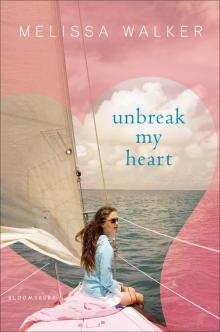 Unbreak My Heart
Unbreak My Heart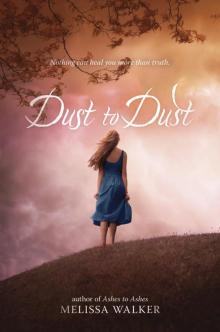 Dust to Dust
Dust to Dust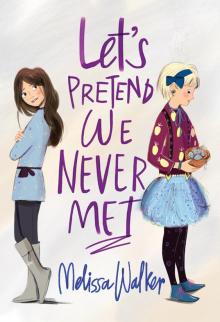 Let's Pretend We Never Met
Let's Pretend We Never Met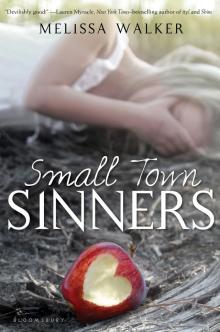 Small Town Sinners
Small Town Sinners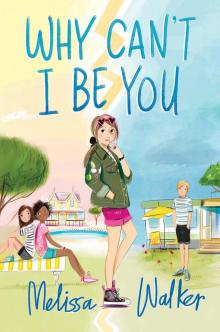 Why Can't I Be You
Why Can't I Be You